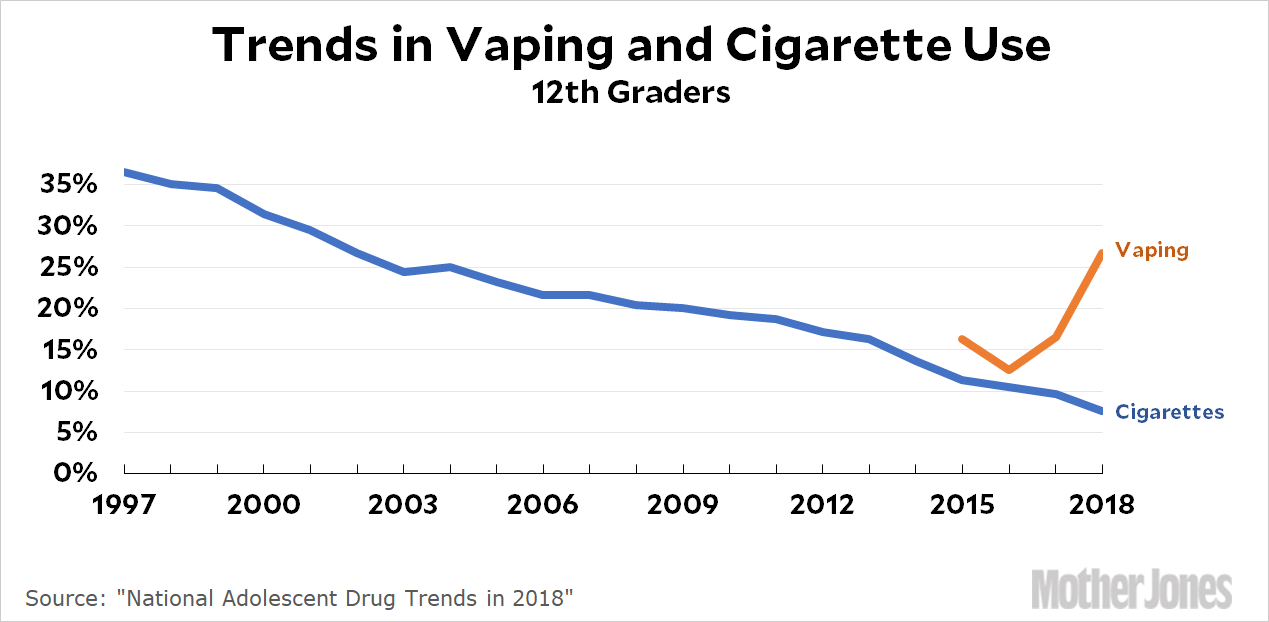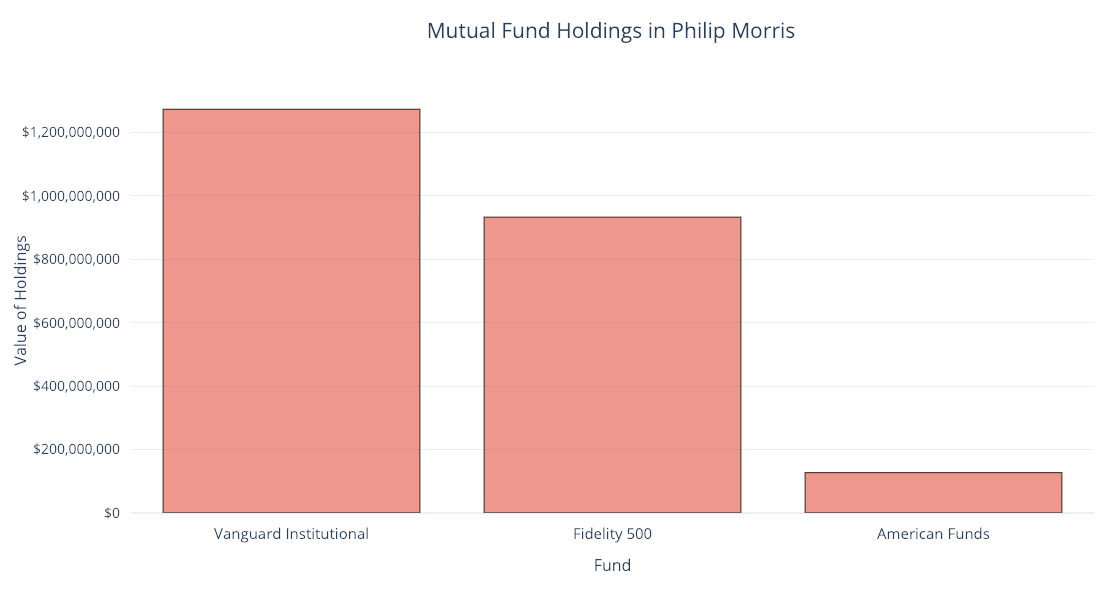On Blame
 (Source)
(Source)
Where we should look to explain negative trends and how we can improve the world
Recently, this chart has started showing up in the news:
 Trends in vaping and cigarettes (Source)
Trends in vaping and cigarettes (Source)
Originally appearing in a y solved this problem but evil cigarette companies are back at it selling poison to our youth.”
While there is nothing more appealing to humans than jumping on the moral outrage bandwagon, recently I’ve tried to stop myself from immediately falling in line by thinking rationally about where the blame for “bad” events should really be placed. If we take a minute to trace the actual source of these developments, we arrive at an answer both more mundane and more disturbing than our instinctual reaction has us believe.
(I’m not in any way trying to downplay the problem of e-cigarette use. The data are alarming — see for yourself — and I am worried about the potential undoing of decades of progress in public health. My point in this article is to show that blaming an “other” gets us no closer to solving the problem.)
Let’s start the blame seeking by considering who started this whole business in the first place: the cigarette companies. Philip Morris International (PMI) is one of the largest members of the worldwide cigarette market, with $67.7 billion in sales, nearly $8 billion in profit, and almost 20% market share. The answer for who to point the finger at is simple right? The ones on top must be held accountable, in this case, Louis Camilleri (Chairman) and André Calantzopoulos (CEO).
However, that’s not quite right, because even though the CEO and Chairman are the public faces of the company, they must report to the board of directors, so we need to shift the burden of guilt to its members (the faces of evil). Unfortunately, we can’t stop there. While the board may push for such evil tactics such as deliberately advertising to teens, as a publicly-held company, the board of Philip Morris International is elected by and answers to one group: the shareholders.
What’s the problem you may ask? Only rich people hold stocks, and they are to blame for poisoning our youth you are tempted to shout. While I have no doubt some very wealthy individuals do own PMI stock, there is another group closer to home that holds a significant fraction of PMI. As a large, relatively stable company, Philip Morris stock is a safe option for long-term investments with little risk, which just happens to be what retirement account investment managers look for. Here’s the kicker: 3 of the most popular retirement mutual funds (measured by managed assets in 401k retirement plans) have substantial investments in Philip Morris International.
We’ve traveled down the Yellow Brick Road of blame, pulled back the curtain on the wizard, and revealed that the ultimate responsibility for big tobacco, hundreds of millions of early deaths, and now, the rise in teen e-cig use is the workers and retirees of America. The next time you see an ad for e-cigarettes, be assured that it was paid for by your parents, your grandparents, and yes, even your hard-earned retirement money.
 Holdings of the 3 largest retirement funds in Philip Morris (sources below)
Holdings of the 3 largest retirement funds in Philip Morris (sources below)
The Vanguard Institutional, Fidelity 500, and American Funds EuroPacific Growth mutual funds hold hundreds of millions of dollars in PMI. Vanguard, the largest provider of mutual funds in the world is the single largest holder of Philip Morris International (yes, in case you are asking, my own retirement and personal investment accounts hold PMI within mutual and index funds).
But wait you cry, hoping to at least distance yourself from the best-known purveyor of electronic cigarettes (and one of the worst offenders when it comes to advertising to children), Juul is privately owned! Well, on Thursday, December 19, Altria Group Incorporated (makers of y knew that because you own Altria Group as part of your Vanguard or Fidelity mutual fund. Moreover, as a shareholder, you were probably thrilled at the news because it seems like a great investment!
(Confusing matters, Altria Group Inc. was renamed from Philip Morris Companies in 2003 to disassociate the company from the negative name of Philip Morris in America. Philip Morris International is now a separate company and Philip Morris USA is part of Altria Group).
Why This Matters and the Good News
Whenever we are confronted with a moral injustice, our immediate reaction is to search for someone to blame. Thanks to our natural tendency towards xenophobia (fear of outsiders) this is almost always an “other”, someone completely unlike our moral, upstanding selves. Let’s consider a typical example.
Americans routinely report they think the world is getting more violent when all of the evidence shows the world is actually more peaceful now than ever before and continues to get less violent. When asked the reason for this discrepancy, most people will blame the news: “it’s the media portraying violence which distorts our view of the world”. It may be true the media (especially local news) focuses undue attention on negative events, but it’s not the media’s job to be objective.
The media has one objective, to entertain the public, and apparently, people continue to be drawn to terrible stories despite a drastic decline in the number of bad events happening. The full responsibility for our corrupted worldview lies with us, the consumers of the media. If everyone suddenly demanded the media portray the world as it really is and watch the channels that did the best job of being objective, then the tenor of the news would rapidly change.
Outrage and blaming of outsiders may be the natural response to moral trespasses, but just because something is natural does not make it right. Xenophobia, violence, and hatred may be some of our most natural tendencies, but no one (save the president of the United States) openly advocates for increased levels of these. Furthermore, blaming someone else prevents you from having to do anything because you are not responsible.
In short, looking for somewhere to place blame — for any situation, large or small — is a temporarily satisfying but long-term disastrous tendency (blaming someone is different than searching for a cause that can be used to prevent the next occurrence of a disaster. The former is instinctual and is about not having to take responsibility while the latter is rational and aims to improve safety).
In case you are despairing by this point, there is hope. If we can avoid the blame instinct, change can happen on both an individual level and societal level. Let’s look at the two scenarios outlined above:
If you don’t like supporting cigarette companies via your retirement funds, you can manage your own retirement funds, or, as I’ve started to do, explore Socially Responsible Investing (SRI), Environmental, Social, and Governance (ESG) investing, or impact investing, all of which take into account “socially beneficial” policies rather than mere profits (Swell Investing is one option). In a bit of positive news, ESG investing has exploded in popularity and now represents around $20 trillion in managed assets worldwide.
Keep in mind that change is hard and requires tradeoffs. You may have to spend more time picking retirement funds and investigating company policies and accept a lower return. Real change doesn’t come without sacrifices.
Furthermore, if you aren’t happy with the traditional media, there is nothing forcing you to turn on the TV or open CNN every day. Instead, you can read books such as The Better Angels of Our Nature; Enlightenment Now; and Factfulness, all of which take an objective look at the world and reach the inevitable conclusion that things are very good and continue to improve.
Also, once you read these books, don’t hesitate to share the “good news” with others. For some reason, people tend to talk to each other about negative events (which just make people more afraid) rather than positive realities such as the fact that 80% of children around the world have been vaccinated or that 80% of the world has access to electricity. Real face-to-face conversations actually do change minds — just look at the extraordinary shift in public perception around gay marriage in the US if you think that people — and by extension society — can’t change.
Conclusions
Some lessons you only learn when people are honest with you and so consider this my attempt to be straight: most of the terrible things that happen in the world are due to not malicious hidden actors but rather to the choices we make every single day. However, my point is not to make you feel worse about yourself; my overall message is positive: you don’t have to wait a minute for someone else to come along and improve the world, you can start right now.
Not to get too philosophical on you, but when you’re looking for someone to blame, start by looking in a mirror. Once you’ve figured out where the real fault lies, start making small changes. You can only directly affect your own life, but by changing your actions, you change those around you and so on until you live in a country where anyone can marry who they choose or in a world where the global poverty rate has fallen by half in the past 20 years! Once we overcome the blame instinct, we can make the world better through the only power available to us: changing ourselves.
This article is based on a similar idea expressed by the late Hans Rosling in his incredible book Factfulness: Ten Reasons We’re Wrong About the World — and Why Things Are Better Than You Think. In his version, he concludes we can convince pharmaceutical companies to produce more malaria drugs for poor nations by punching our grandmothers. s.com/book/show/34890015-factfulness) is an excellent objective look at the world and I highly recommend it as well as the GapMinder Project if you want to be less ignorant about the world).
As always, I welcome feedback and constructive criticism. I can be reached on Twitter @koehrsen_will or through my website willk.online.